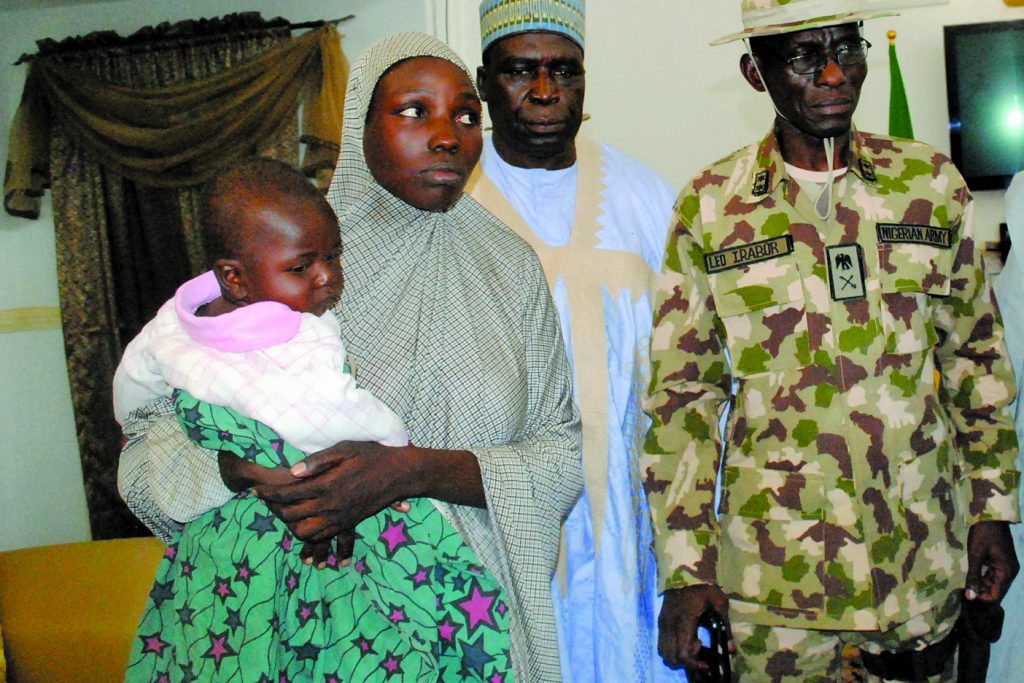Maryam Ali Maiyanga is happy to be reunited with her family. It was a tearful reunion in October 2016. She was among the 276 girls that Boko Haram militants abducted from a government school in Chibok in northeastern Borno State, Nigeria, in April 2014, sparking a worldwide plea for their rescue and the social media movement and Twitter campaign #BringBackOurGirls.
Things have significantly changed for Maiyanga since that unfortunate night. As she holds her 10-month-old son, it is apparent that life will never be the same again for her.
“I am happy to be alive and reunited with my family. For the families of my sisters still missing, don’t lose hope, they will also be found,” says Maiyanga via a translator over the phone in Abuja, Nigeria’s capital.
Her discovery comes after 21 of the abducted girls were freed following negotiations brokered by the International Committee of the Red Cross (ICRC) and the government of Switzerland.
Boko Haram, colloquially translated to “Western education is forbidden”, has claimed over 15,000 people and displaced some two million over the past seven years as part of its bid to establish an Islamic state in the north, according to Reuters. Its eradication was one of the main cornerstones of Nigerian President Muhammadu Buhari’s election campaign in 2015.
Loading...
“This is positive news for our missing girls but the battle is far from over. The world should not rest until this injustice is laid to rest and all our girls have been returned to their families,” says Sekina Abdulai, founder of the Chibok Community in Maiduguri, the capital of Borno State.
The release of the 21 girls although positive, is a bitter reminder of the fate of the other missing girls, some of whom are presumed dead, according to Abdulai.
Speaking at a press conference in Abuja, Alhaji Lai Mohammed, Nigeria’s Minister of Information and Culture, disclosed to reporters that the release of the girls was due to the persistence to close this negative chapter in the nation’s history.
“The circumstances behind the release of the girls are still unclear but it is believed that some large sums of money was exchanged as well as the release of some Boko Haram fighters,” says a source in the Office of the National Security Advisor (ONSA).
Fatima Alhassan’s daughter, Aisha, is still missing. When she heard about the release of the 21 girls, she took a bus from her hometown in the northeast to Abuja in the hopes of finding her in the group.
“A friend of mine told me some girls had been released and even though they did not call me, I decided to come and see if my daughter was here. Unfortunately, she was not but I am hopeful that like these girls she will return to me,” says Alhassan.
That reunion might be more imminent than she thinks.
“We are currently in talks with members of the militant group who want to negotiate the release of the girls. They say they are ready to talk if the government is willing to negotiate and it is our intention to do whatever we can to get these girls back,” says Garba Shehu, official spokesperson to President Buhari.
According to Shehu, 83 more girls are expected to be released in the coming months if negotiations with the militants remain positive.
For now, the government is unwilling to disclose what the militants want in exchange although sources close to the government believe there is a financial incentive on the table.
The focus now is the rehabilitation of the released girls. That task falls on the shoulders of Eleanor Nwadinobi, the women and girls’ manager of the Nigeria Stability and Recognition Programme.
“These girls have suffered a terrible ordeal and our rehabilitation efforts need to take a focused individual treatment approach. We have to provide trauma-counseling sessions, health-screening tests as well as ensuring that these girls have the best tools to successfully reintegrate back into society,” says Nwadinobi.
A source close to the current negotiations of the 83 girls disclosed on condition of anonymity that “given the current plight of the Nigerian economy, it is in the government’s interest to at least deliver on President Buhari’s bold claims of eradicating Boko Haram which his whole campaign was built on. To this effect, they will pay whatever amount and negotiate with the terrorists to get this type of good PR”.
According to Reuters, the 83 girls were with the faction of Boko Haram under the control of figurehead Abubakar Shekau who has split from Boko Haram after disregarding new instructions from Iraq and Syria naming Abu Musab al-Barnawi as its new leader for West Africa.
“This infighting might be the best opportunity for these poor girls who have already lost two years. If Shekau remains defiant, he risks being alienated from the group and therefore he needs more allies. I would imagine negotiations will include returning some of his loyal fighters back to him to help him regain his command,” says Frank Adu, a security consultant working in Abuja.
No matter what the reasons are for this apparent divide, the return of the 21 girls is symbolic of hope and an end to the torment and pain endured by their families. For those still missing, the battle lingers on. For now, hope is the only thing they can hold on to.
Loading...
